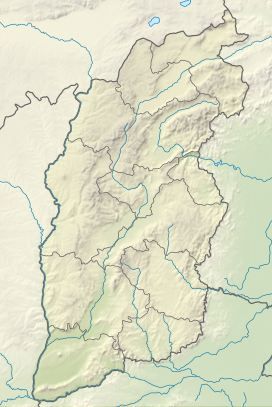| Niangzi Pass | |
|---|---|
| Traversed by | Shijiazhuang–Taiyuan railway, Shanxi Provincial Road S315 |
| Location | Border between Shanxi and Hebei provinces |
| Range | Taihang Mountains |
| Coordinates | 37°58′01.34″N 113°52′40.65″E / 37.9670389°N 113.8779583°E |
| Niangzi Pass | |||||||
|---|---|---|---|---|---|---|---|
| Traditional Chinese | 娘子關 | ||||||
| Simplified Chinese | 娘子关 | ||||||
| |||||||
Niangzi Pass (simplified Chinese: 娘子关; traditional Chinese: 娘子關; pinyin: Niángzǐ Guān), also called the Ladies' Pass, is a mountain pass west of Shijiazhuang, capital of Hebei Province in North China. One of the major passages from Shanxi Province to Hebei Province across the Taihang Mountains, it is 55 kilometres (34 mi) west of Shijiazhuang, at the point where the Shitai Railway (Shijiazhuang--Taiyuan, capital of Shanxi) crosses the border between the two provinces on its way to Taiyuan.
Surrounded by a maze of hills and valleys, Niangziguan Pass was famed as "the Ninth Pass on the Great wall". The extant pass was built in 1542 during the Ming dynasty. The pass is flanked by mountain more than 1,000 metres high. A tributary of the Yellow River, Tao River, twists its way through the valleys below. In ancient times this provided a narrow passage for men and horses.
Legend goes that during the Tang dynasty, the army under the command of Princess Pingyang, daughter of Li Yuan, the first emperor and founder of the Tang dynasty, once garrisoned here. Hence, it was dubbed as the epithet "Ladies' Pass".
Its defence played an important part in the Battle of Xinkou between the Chinese Nationalists and the Japanese detachment.



